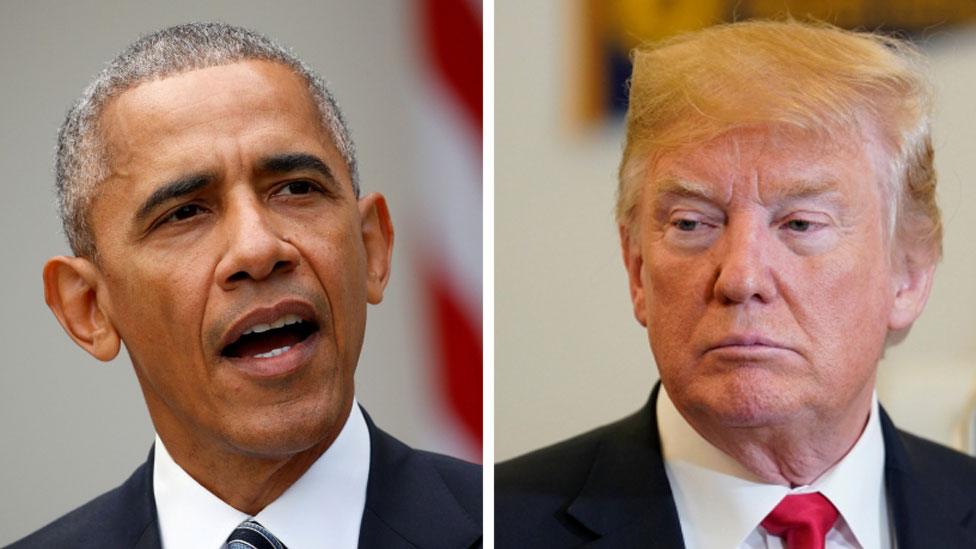Will Trumpcare replace Obamacare?
- Published
What do Americans think of Obamacare today?
US House Republicans are hoping their plan to replace President Barack Obama's healthcare law will be passed by Congress.
The American Health Care Act would eliminate the current law's mandate requiring Americans to have health insurance and instead focuses on new tax credits to encourage people to buy insurance.
But Republicans are not happy with the draft bill and despite holding majorities in both chambers of Congress, divisions remain on what should replace so-called Obamacare.
As the party battles it out over the right way forward, will they finally be able to undo the last president's signature domestic achievement?
Remind me, what is Obamacare?
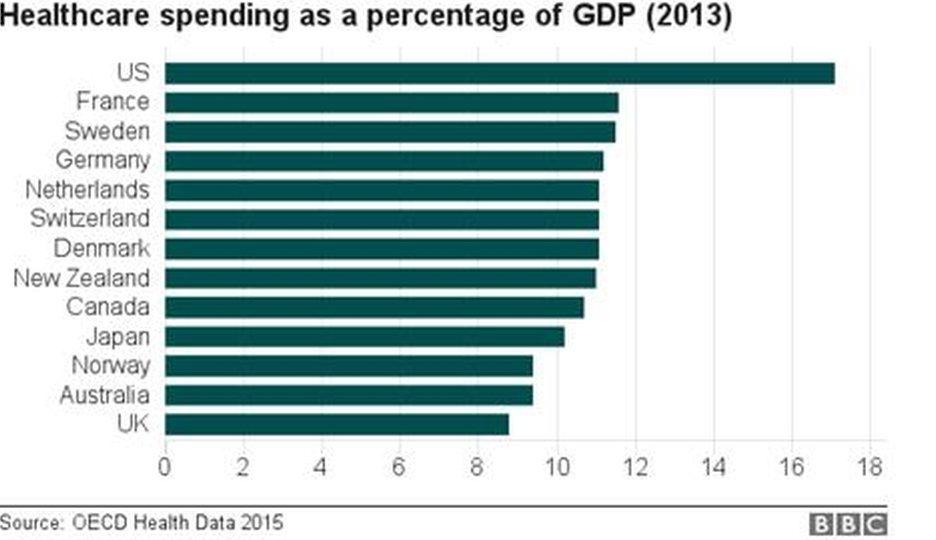
The Patient Protection and Affordable Care Act, the law's formal name, aims to decelerate the growth of US health spending, which is the highest in the world.
Obamacare is kept solvent by an individual mandate that requires Americans who do not receive medical insurance through their employers, or free healthcare from the government, to buy such coverage through government-run websites called marketplaces.
The programme offers subsidies to make health insurance more affordable and aims to reduce the cost of such policies by bringing younger, healthier people into the medical coverage system.
Obamacare also requires businesses with more than 50 full-time employees to offer health insurance.
Why is it so controversial?
What is "Obamacare", and why are Republicans against it?
There around 20 million additional Americans who now have health insurance under the law.
But the programme has been rocked by premium hikes - which were a problem before Obamacare - and a trio of national insurers abandoning the online marketplaces.
Its individual mandate is unpopular because many uninsured Americans who end up paying tax penalties are low-to-moderate income workers juggling rent, car payments or student loans.
But the law is popular, too, because it bans insurance companies from denying health coverage to people with pre-existing health conditions and allows young people to remain on their parents' plans until age 26.
Obamacare has also defied Republican predictions that it would bloat government expenditure - the Congressional Budget Office said in 2015 that repealing Obamacare outright would increase the federal budget deficit by $137bn (£112bn) by 2025.
What is the Republican plan?
The proposal would preserve some popular elements of the existing law, such as allowing young people to stay on their parents plans and barring insurers from denying coverage to people with pre-existing conditions.
But it will cover fewer people than those who gained insurance under the Affordable Care Act, according to the nonpartisan Congressional Budget Office, mostly due to the removal of the individual mandate.
While penalties for those who don't buy health insurance would be scrapped, those who let their coverage lapse could see their insurance premiums raised by 30%.
The Republican legislation would limit future federal funding for Medicaid, which covers low-income people.
It also repeals the mandate that larger employers must offer insurance to their employees.
The bill has already passed through two House committees, clearing the way for the full House to take it up before members leave for spring break on 7 April.
Since Republican senators do not have the votes needed to repeal Obamacare outright, they are planning to pass their plan through a budget reconciliation process that only requires a simple majority.
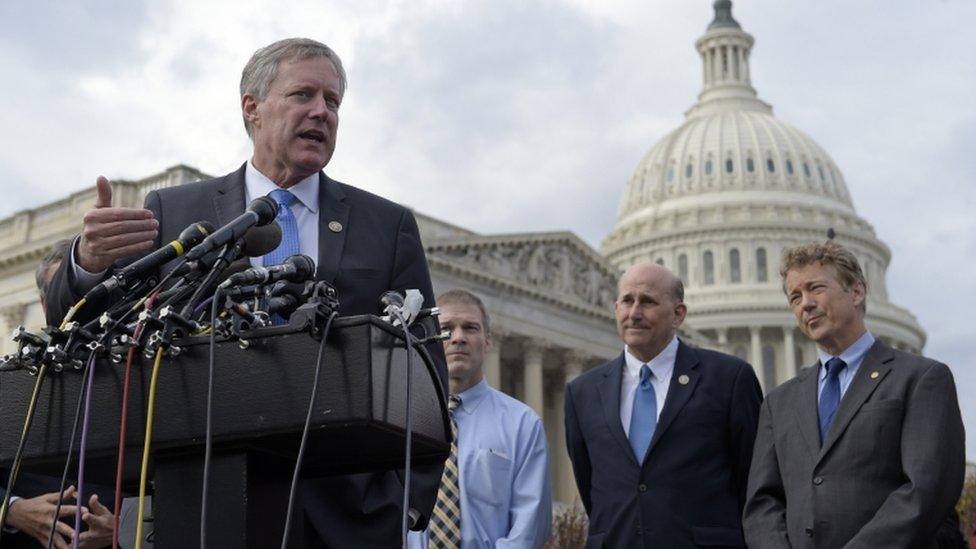
Several Republican senators have expressed doubts about their party's healthcare bill
Some conservatives have already balked at the plan for not going far enough.
At least four Republicans in the Senate have already said that the new legislation does not adequately protect low-income people who received Medicaid coverage under the Affordable Care Act.
But some hard-line conservatives call it "Obamacare 2.0".
"It still looks like Obamacare-lite to me," said Kentucky Senator Rand Paul.
How is the new plan different?
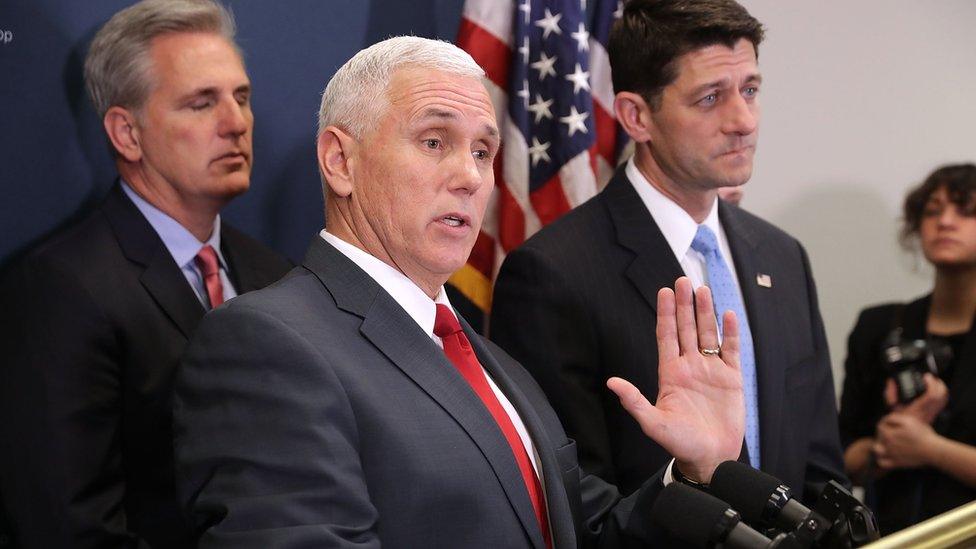
Vice President-elect Mike Pence (M), House Majority Leader Kevin McCarthy (L) and Speaker of the House Paul Ryan (R)
The new plan removes penalties for the uninsured as well as replaces income-based subsidies to help with the cost of premiums with age-based tax credits.
The House plan also substantially rolls back the expansion of Medicaid, a federal healthcare programme for low-income Americans, which has been popular in some poorer states such as Kentucky.
Nearly half of the Americans who gained healthcare coverage under Obamacare received it through the expansion of Medicaid, which would end in 2020 under the new plan.
The proposal would also eliminate subsidies for those with modest incomes, replacing them with age-based tax credits to mitigate the cost of premiums.
What does the Congressional Budget Office predict?
Residents of Kentucky, one of the unhealthiest states in America, talk to the BBC about their hopes and concerns about Obamacare
The nonpartisan Congressional Budget Office (CBO) said in their much-anticipated report that the Republican replacement legislation, called the American Health Care Act, would lead to 24 million less Americans with health insurance.
They estimate that by 2026 there will be 52 million uninsured Americans, compared to 28 million currently forecast under current law.
That loss is attributed mainly to Americans no longer being required under Obamacare to purchase insurance or otherwise face a tax penalty.
But the CBO report does find that the Republican plan will shrink the federal budget deficit by $337bn by 2026, which will please fiscal conservatives.
The White House rejected the report's findings, with Mr Trump's budget director calling the CBO "terrible at counting coverage", and pointing out that they had inaccurately estimated how many Americans would enroll in Obamacare.
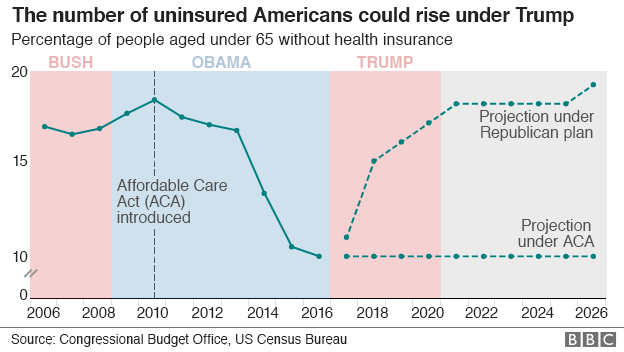

What can Trump do?
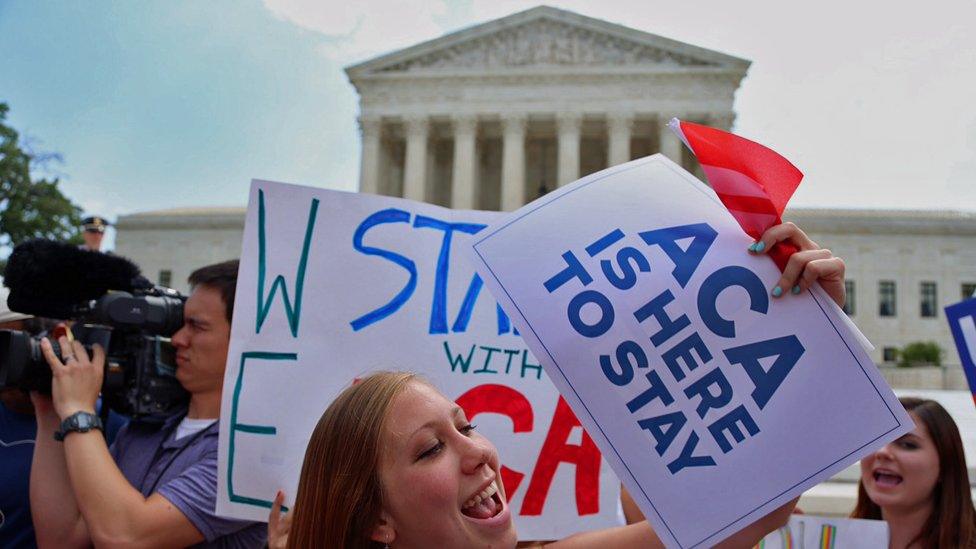
Supporters of the Affordable Care Act celebrate its survival of a Supreme Court challenge in June 2015
Mr Trump has signed an executive order directing federal departments to take actions to ease the regulatory requirements from Obamacare.
The directive, which offered few specific details, appeared to be more of a broad mission statement.
However, the order could undermine the law's individual mandate by granting more exemptions to people who do not want to buy health insurance.
Though it will take Congress to repeal major parts of Obamacare, Mr Trump could also cripple it with a stroke of a pen.
As president, he could simply drop the federal government's appeal against a lawsuit, House v Burwell, which Republican House of Representatives members won in April 2016.
That legal action argued the Obama administration was unconstitutionally spending money that Congress had not formally appropriated by reimbursing health insurers who provide coverage to low-income policyholders.
If Mr Trump opts to drop the government's challenge, insurers who are currently giving deep discounts to half their customers would lose their reimbursements. And that, say analysts, would send Obamacare into a death spiral.
- Published29 March 2019
